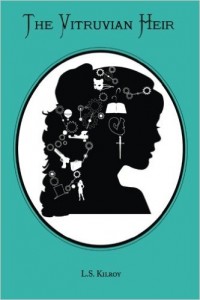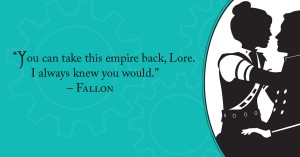The Virtruvian Heir by L.S. Kilroy* is a quirky little book that covers courtesan spies, Victorian stuffiness, and futuristic technology in one fell swoop. Kilroy was inspired to write this book by history class, of all things, which introduced her to Catherine de’ Medici and her group of female spies during the reign of Henry II. Rather than take the whole historical context, Kilroy has based the society in her book on the Victorian era. The setting and inspiration for the book could fool you into thinking it’s historical fiction, but it actually falls into the speculative genre. Set in the United States hundreds of years after a buttload of conflict, The Vitruvian Heir serves up a comfortable premise for lovers of dystopian YA—there was war, people screwed up, and now they are stuck in an unfair, messed-up society.
 For all that the set up is familiar, I appreciated the story’s unique elements. The society lives according to Victorian standards because some weirdo king decided he liked the setup of the Victorians best, which I find oddly endearing. I also thought the twist on classic steampunk worked quite well—instead of machinery powered by steam, there are creatures powered by yoctosteam, which is actually tiny nanobots. Hints like that let you know you’re rooted in the future even if it seems like the past.
For all that the set up is familiar, I appreciated the story’s unique elements. The society lives according to Victorian standards because some weirdo king decided he liked the setup of the Victorians best, which I find oddly endearing. I also thought the twist on classic steampunk worked quite well—instead of machinery powered by steam, there are creatures powered by yoctosteam, which is actually tiny nanobots. Hints like that let you know you’re rooted in the future even if it seems like the past.
Overall, the Victorian setting works. I liked that the main character, Lore, quickly realizes that her position of privilege doesn’t mean she has many freedoms, but is more concerned with the indignities against her friends. She doesn’t mope around on the “woe is me” train but fights to ensure the women around her are protected and happy. The main plot of oppressed women fighting for their freedom is a one that unsurprisingly appealed to me and probably would work for most Minerva readers as well. I appreciated that the story tried to dig a little deeper than just “women can’t own property” by exploring some of the horrific violence that can occur when society is so firmly rooted in sexist ideals. For all that the Victorians tried to be pure sexless creatures, you know that the cruelty and sexual violence men heartlessly bestow on women in this novel must have happened to some degree in our history as well.
The story does sometimes strike the wrong notes. The amount of intrigue and secrets that fill this book would be enough to pack full a novel twice the length, and to make sure they’re all revealed in the story, some characters all too willingly reveal deeply personal information. I thought the use of flashbacks in the second half of the novel sometimes worked well and sometimes distracted from the present action. When someone gets into a gunfight, I do not want to read ten pages of memories before the gunfight starts back up again. I would have also liked the love interests to be fleshed out more. Avery seems to appear out of nowhere, and while I think I could have been onboard with him, I never really understood why Lore had fallen for him in the first place.
Really, when I think about this book, my main complaint is that I like everything going on, but I want it to tease out its intricacies more. I’d like if more characters spent more time withholding their secrets to build the suspense. I want the characters to have more room to breathe. I rarely recommend books get longer—and god knows it’s nice to see a science-fiction fantasy type story that isn’t 1,000 pages long and the first book in a 12-book series—but I think The Vitruvian Heir could be 100 pages longer and still tell an interesting tale of intrigue.
What does that ultimately mean for the book? As a first-time author, I think L.S. Kilroy shows a lot of promise. I like her themes, I like most of the characters, and I like a lot of the setting. The pacing issues and some of the unresolved or underdeveloped subplots make the book read at times like it’s a first novel. But then again, most authors’ first novels read like a first novel. What I recommend is that if you like themes of female empowerment, odd dystopias, and a whole mess of intrigue, secrets, and lies, you’ll probably enjoy this book. Personally, I’ll be interested to see how Kilroy continues to hone and improve her writing abilities for future books.
*L.S. Kilroy has written several articles for Minerva about Shakespeare heroines, Scarlett O’Hara and other suitably geeky things.
Cover image via Wikimedia Commons. Book images via L.S. Kilroy.


